Podcast: 22 minutes. Listen Now, or Download to Your Favorite App for Later, by clicking on “Listen in Podcast App” above right.
Black travelers with covered wagons on the overland trails? Absolutely!
Dr. Shirley Ann Wilson Moore is author of Sweet Freedom's Plains: African Americans on the Overland Trails, 1841-1869, the book on which my latest Tales post, Black Americans and Covered Wagons, is based. Dr. Moore’s book and her research for the National Park Service are changing how the American public understands 19th century Westward Migration after all the misimpressions left by Hollywood Westerns.
Recently, I sat down (via Zoom) with Dr. Moore, and this is our interview, in downloadable audio podcast format.
Our chat is also available on video at this link.
You can also read it below as an edited transcript.
TRANSCRIPT
Edited for clarity.
Annette Laing: Welcome to Non-Boring History. Today we're going to be talking about a truly fantastic book. It’s Sweet Freedom's Plains: African Americans on the Overland Trail from 1841 to 1869, written by Shirley Ann Wilson Moore. This is an academic book, but please don't stop watching, because I do think this book engages an awful lot of people outside of history departments.
I'm delighted to say that today I have with me Dr. Moore herself. She holds a PhD in American history from the University of California, Berkeley. She is a professor emeritus at California State University. Sacramento. She's a specialist in African-American history and especially African-American women in the West. She's the author of three books, including this one [for which Dr. Moore won the 2019 Barbara Sudler Award for best non-fiction book on a western American subject authored by a woman.]
Dr. Moore has also written numerous articles, essays, and book chapters, and she has served as a consultant on projects for the public, including with the National Park Service, as well as on various documentaries. So with that, thank you very much for joining me at Non-Boring History today, Shirley.
Shirley Moore: Well, it's my pleasure and it's delightful to be here. So we'll have to live up to Non-Boring History, right?
Annette Laing: Exactly! We're two historians. This is not a good start. We will do our best!
So who were they? Who were the African American folks who went West?
Shirley Moore: You know, that's a really good question. As to numbers, I don't think we'll ever establish the numbers of black people who went West. I've seen estimates from 5,000 to 50,000. So we'll never know. Because officials who were in charge of census taking of the travelers, those who were enslaved, their owners didn't refer to them or count them for anything other than black, or black woman, black man. They were ignored and discounted. So we'll never know the numbers.
However, one thing we have to understand, and probably most people don't think that in the pioneer days, the wagon train days, that African Americans were involved at all. That is not the case. Black immigrants, travelers, were involved in every aspect of that process from start to finish. And they were not all enslaved. Many free blacks came. So their invisibility doesn't stem from the fact that they weren't there. They were seen as inconsequential. So that's why this cloak of invisibility surrounded them, as far as whites were concerned,
Annette Laing: The knowledge that most people have of the wagon trains is based more on 1950s westerns than anything. Most people haven't a clue, starting with the fact that people were not traveling in the wagons, but walking next to them.
What makes black folks' overland journeys especially significant?
Shirley Moore: That's one of the questions I set out to explore in Sweet Freedom's Plains. What I discovered is that many blacks came West for similar reasons as their white counterparts. You know, the West was the land of starting over, in the popular imagination. It was a place where you could reinvent yourself, a place where you had greater freedoms. That was in the popular imagination, and certainly African Americans held to those reasons.
But especially those who are were enslaved, and those who were restricted by black laws and Black Codes--even if you were free in the so-called free states and certainly, in the slave states, if you had a free status, that meant very little-- were hemmed in by laws. You had no political status. You had no citizenship status. So it was tough for even free Blacks, in free states and certainly in the South. They came West seeking relief from those conditions.
The title of the book, as a matter of fact, came from an old abolitionist hymn, you know, abolitionist words, from the anti-slavery movement, grafted onto hymns. The title is from one of these abolitionist hymns called The Flying Slave. One verse in that hymn says "Behind, I left the whips and chains. Before me, lay sweet freedom's plains." That's where the title comes from. That alone was, you know, worth the discovery. I knew when I heard it, that would be the title for the book. I knew it.
Annette Laing: So when people embarked full of hope on this journey west. . . I mean, this, we know, was not an easy journey for anyone . . .
Shirley Moore: For anybody.
Annette Laing: What specific challenges did black folks run into?
Shirley Moore: As I said, they were counted whether they were free or enslaved, They were counted as non-people. Many wagon companies had in their charters provisions that restricted them from taking on Black travelers. Even if they could pay, they weren't allowed to be on those [wagon] trains. So, once they could secure passage, either by paying or working, they had to wait around those jumping off towns longer than their white counterparts. They had to figure out where they were going to stay as they waited, that kind of thing.
So from the beginning, even before they hit the trails, this was the dilemma that white travelers, white overlanders, didn't face. And on the trails, they were, of course, as slaves, required to work. Everybody worked under horrific conditions that we would just shudder at. But for Blacks, they had no choice. They were on call 24 hours a day, 7 days a week. They did the most onerous, difficult work possible.
There is one company, these were the so-called Mississippi Mormons, that made the journey in two stages, coming from Mississippi. There were a number of Blacks in that company, and one of the leaders of the train recorded that everybody suffered the terrible cold conditions. They suffered terribly but, as the person, whose name escapes me, writes in his journal, the Negroes suffered the most. And several died and were buried along the trail. It was commonplace for slaves to be worked in horrific conditions. And throughout the slave states, slaves, especially in the wintertime suffered from pneumonia. They called it . . . Oh, gosh. I forgot the name. It's in the book, so look it up! [laughter] So, they suffered from this, and they were routinely expected to die. So, this was a burden. They were routinely expected to be, as I say in the book, pack animals.
Annette Laing: But at the same time, one of the things that really came out in the book to me, and I'm thinking here of people like George W. Bush, who's handing out loans and things . . . There was this sort of crucible on the overland trail. Maybe you could address that.
Shirley Moore: One of the reasons, you asked me why did they come West, one of the popular notions about the West was that some of these racial proscriptions could be left behind and capability and ability and prowess could trump those racial categories.
Bush, who was a free black man, and he left with his five sons, and his wife who was white, left Missouri, he epitomized that. George W. Bush --that improbable name! His chronicler and friend wrote in journals that George W. Bush was the most capable man he'd ever met. He not only financed several of the company members who were cash-strapped, because he was a successful farmer, and businessman in Missouri. He also bought wagons for them, provisioned their wagons, and so on. And when they were going through starving times, he taught them to hunt small game, and he was the provider.
So he's an outstanding example of that notion that ability could at times overcome those stigmas. That was on the Trail. Now, when he made it to his destination in Oregon Territory, he was not allowed to own the land that he had homesteaded. And so the US Congress had to make a special petition for George Bush to own these lands up in the Puget Sound area.
Bush is a fascinating story. This book is full of stories. It's full of footnotes, dense, wonderful footnotes . . .(laughing) But you can ignore those. You don't have to read them.
Annette Laing: Don't worry, audience!
Shirley Moore: Yeah, don't worry. Don't let that scare you off the stories. I like to think that this book is full of stories that Hollywood hasn't even tapped into. Real life.
Annette Laing: That's absolutely right. I mean, there are so many. And it complicates things, doesn't it? I've asked you to do this interview in such a short time, and we can't just reduce it to "Did they get there, and everything went great or not?” Because it's impossible, right?
Shirley Moore: It is impossible to do that. But the complications, the complexities, the nuances of this whole journey, that's what makes it so interesting to me.
And I think your viewers and listeners would be interested to know that these overlanders in this timespan I'm looking at weren't the first Blacks in the west.
You know, you had black mountain men, black guides, for whom this was their territory. And I talk about that in the book. I think that in the complexity and the complications, that's where you get the real stories. Once Blacks set out on the trails, took first steps on the trails, whether they were enslaved or free, they knew something had changed. And there were Blacks who, and I call them facilitators, who never made the Overland journey, but were very, very instrumental in allowing it to happen, in facilitating it.
One such person was a man by the name of Hiram Young. He was a former slave. He didn't know how to read or write, but he rose to be, I think, the third wealthiest man in in Missouri. He was based in Independence, Missouri. He came up with a wagon [design]. The wagon was the iconic symbol, right, of the overland trip of pioneer days, of westward migration? [Young built] a wagon that was preferred by most overlanders. They called it, in short, the Hiram Young wagon. And it was lighter, smaller, just easier to work with. He had plaques put up on the wagons that bore his name.
But he didn't stop at that. He had a business conglomerate in this jumping-off town of Independence, Missouri, where everybody came to provision themselves, to get supplies. He supplied them from his farms. He had cornered the market on yoke making. Oxen were the preferred mode of force pulling the wagons, so he cornered the market on oxen, yokes, wagons, food. He had farms. He was an interesting, interesting person, Hiram Young, because he employed slaves from the surrounding area, Missouri being a slave state, and gave them a working wage. His thought was that they can buy their freedom just as he did, and perhaps buy one of his wagons, and head West. He also employed white workers, and let some of them board in his home, which was breaking every racial taboo at the time.
Annette Laing: Like the white Irishman that you mentioned.
Shirley Moore: Oh, yes. And so Hiram Young was a facilitator, and I don't think people associate the iconic symbol of overland immigration with a Black man. You know, he made it, and he sold wagons to anyone who could purchase them. One of his contemporaries said that you could see Hiram Young wagons on the trails from Missouri out to California and beyond, that's how popular they were.
Annette Laing: He's mentioned in Independence, which is where I first learned of him. But this is news that is just not trickling down into schools. You know, I mean, I talk about westward migration, I talk about Hiram Young in schools. And this is all kind of news to people. Have you seen some progress with, you know, certainly with the National Park Service.?
Shirley Moore: Yes. Yes, this book actually started out as a report. The National Park Service contacted me and asked me if I'd be interested in writing a report, so they could update their materials on the various trails and their various facilities, update that signage, and update the language. And I thought, well, it's intriguing. I, like everybody else, didn't know much about the Blacks on the Overland trail, but I completed that report and they were pleased with it.
But I knew, as I was working on the report, there was much more to be said about this, and that's what sparked me into continuing to this book.
The National Park Service wanted to make changes and be more inclusive, and I know there's a hunger out there, as I've gone around and talked about these issues. People are hungry for it, from grade schools to adults who haven't been in school in a very long time, to everybody, and it strikes a chord because it is such a diversity of experience. We can't talk about the Black overlanders' experience because they had some things in common, but they had such different experiences.
Annette Laing: You bring that out so, so well. This is a really compelling set of stories, and with really fascinating overarching arguments. You know, I have deliberately limited our time, which I hate, because I could really have this conversation all day.
Shirley Moore: We could!
Annette Laing: So we really have to have you back. But I want to thank you so much, Dr. Moore, for taking the time out to talk to me today.
I just want to remind everybody that Sweet Freedom's Plains is available in libraries, for sale in independent bookstores, and on A____n, the online store we don't talk about. I do recommend this book, and I don't recommend all academic books for a popular audience.
So once again, thank you, Dr. Shirley Moore.
Shirley Moore: Thank you so much. Next time I come back, I have to tell you about the two Black women who were kicked out of the wagon train, a super story.
Annette Laing: I want to hear that, and I also want to talk about the cover, and your interviews you did with people, and you name it! Thank you again, so much.
Share this podcast with a friend. And don’t forget to subscribe to Non-Boring History! You can sign up in seconds for FREE emails, or opt for an annual or monthly subscription for the full experience, including moderated comments.








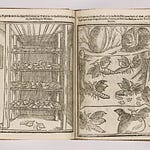

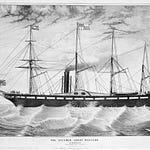

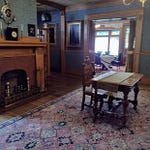
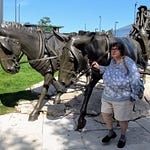
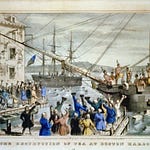

Share this post